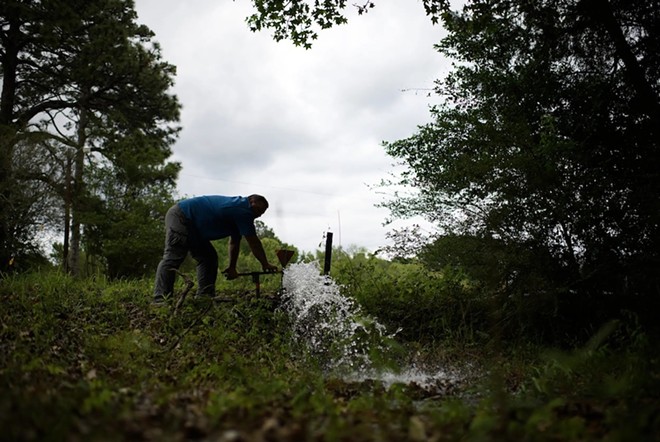
Texas Tribune / Mark Felix
Tom Bailey flushes out a water line in Zavalla on April 10, 2023. Like many small cities, Zavalla has struggled to maintain up with repairs to its water infrastructure.
Join The Temporary, The Texas Tribune’s day by day publication that retains readers in control on probably the most important Texas information.
LUBBOCK — Texas communities will quickly obtain billions of {dollars} to enhance their water infrastructure and broaden broadband entry after voters overwhelmingly accredited two constitutional amendments this week — a historic funding that goals to assist the state’s smaller and cash-strapped municipalities.
State lawmakers requested voters to approve devoted funding for water and broadband utilizing tax {dollars} already collected. Voters stated sure, with 78% approving the water fund and 69% approving the broadband proposal, in line with unofficial outcomes Wednesday morning.
Voters additionally accredited comparable proposals for college analysis and power infrastructure. The water and broadband points will possible yield the best boon for rural Texas, supporters of the initiatives say. Now the work turns to determining how these communities will apply for and obtain the cash.
The Texas Water Fund was formally created with voter approval for Proposition 6, allocating $1 billion to tasks that handle a spread of points from water loss and high quality to buying new water sources, and Texas’ deteriorating pipes. It’s the most important funding in water infrastructure by state lawmakers since 2013.
The fund can be administered by the Texas Water Improvement Board. At the very least $250 million of the fund will go towards tasks that create new sources of water provide. In keeping with the board, the following step is making ready guidelines for the monetary help applications.
Water advocates are hopeful that voters approving such a major quantity for water enhancements will open the door for extra funding to deal with the continued points.
“The $1 billion opens the door to an even bigger dialog that should occur,” stated Jeremy Mazur, senior coverage adviser for Texas 2036.
The approval can be a win for rural communities which have beforehand been left at nighttime in terms of funding alternatives. The laws spells out how the cash is for use and directs the water board to make sure that a portion of the cash goes to rural areas and municipalities with lower than 150,000 residents.
“That is going to be the primary likelihood that a whole lot of these smaller, extra rural communities have had shortly to entry stable funding at favorable, reasonably priced charges,” stated Perry Fowler, government director of the Texas Water Infrastructure Community.
The water issues in Texas are statewide however are particularly prevalent within the rural cities the place the tax base can’t sustain with pricey repairs or constant upkeep.
Voters additionally accredited the creation of the Broadband Infrastructure Fund, which allocates $1.5 billion for expanded broadband improvement and finance 911 providers. That is probably the most cash invested by state lawmakers towards the problem.
The cash might go a great distance for telecommunications suppliers which can be accredited for infrastructure tasks, notably in rural communities which have little to no broadband availability. A map from the state broadband workplace reveals disparities throughout the state.
“There are many areas of the state that don’t have broadband providers,” stated Walt Baum, president of the Texas Cable Affiliation. “And, there are areas within the state the place they do, however there are worth or different limitations. So there can be cash in these applications to maintain each of these audiences.”
The fund may also give the state leverage in terms of matching federal {dollars} from the Broadband Fairness, Entry and Deployment program. Texas was awarded $3.3 billion from this system — probably the most of any state — as a part of the Infrastructure and Jobs Act handed in 2021, which each Republican U.S. Sen. John Cornyn and Sen. Ted Cruz voted in opposition to.
Advocates had been involved in regards to the letter of credit score required for federal funding, however that has modified. Below a proposed rule, candidates would have been required to have a line of credit score from a serious financial institution and put up 25% of the undertaking prices forward of time, which might not have been possible for rural communications suppliers.
Texas Rural Funders and different nationwide companions led efforts to gather signatures asking the Nationwide Telecommunications and Data Administration for alternate options, and so they have up to date steerage to make funding extra accessible for smaller and rural suppliers. Now, candidates can obtain letters of credit score from credit score unions or use efficiency bonds as an alternative, amongst different adjustments.
Whereas it could take time for Texans to see change with federal funding, they might see it sooner with the cash accredited in Proposition 8.
“The funding from Prop 8 can be obtainable a lot sooner and can be utilized for a wide range of broadband wants,” stated Kelty Garbee, government director for Texas Rural Funders. “Which might begin rapidly in early 2024.”
Disclosure: Texas 2036, Texas Rural Funders and Texas Cable Affiliation have been monetary supporters of The Texas Tribune, a nonprofit, nonpartisan information group that’s funded partially by donations from members, foundations and company sponsors. Monetary supporters play no position within the Tribune’s journalism. Discover a full record of them right here.
This text initially appeared within the Texas Tribune.
The Texas Tribune is a member-supported, nonpartisan newsroom informing and fascinating Texans on state politics and coverage. Study extra at texastribune.org.
Subscribe to SA Present newsletters.
Observe us: Apple Information | Google Information | NewsBreak | Reddit | Instagram | Fb | Twitter| Or join our RSS Feed





